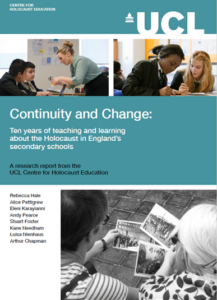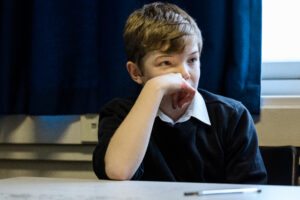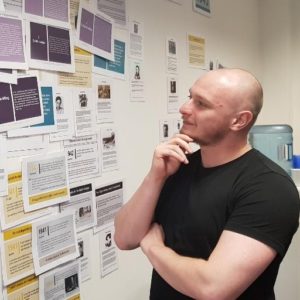Authors: Rebecca Hale, Alice Pettigrew, Eleni Karayianni, Andy Pearce, Stuart Foster, Kane Needham, Luisa Nienhaus and Arthur Chapman
Continuity and Change: Ten Years of Teaching and Learning about the Holocaust in England’s secondary schools, published in 2023, explores the development of Holocaust education in the decade following the Centre’s landmark 2009 study Teaching about the Holocaust in English Secondary Schools: An empirical study of national trends, perspectives and practice
 The Continuity and Change study examines teachers’ aims, definitions, content, pedagogy, assessment, knowledge, understanding, curriculum planning, challenges encountered and training experiences in 2019/20 and explores how this compares with the situation in 2009. Like its counterpart in 2009, the Continuity and Change study took a mixed methods approach. In total, 1,077 teachers from across England completed a comprehensive survey with 964 of them reporting they had taught about the Holocaust during the previous three years. Interviews were conducted with a subsample of survey respondents to discuss their teaching practice in greater depth. In total, 134 teachers from 45 schools across England took part in either small group or individual interviews.
The Continuity and Change study examines teachers’ aims, definitions, content, pedagogy, assessment, knowledge, understanding, curriculum planning, challenges encountered and training experiences in 2019/20 and explores how this compares with the situation in 2009. Like its counterpart in 2009, the Continuity and Change study took a mixed methods approach. In total, 1,077 teachers from across England completed a comprehensive survey with 964 of them reporting they had taught about the Holocaust during the previous three years. Interviews were conducted with a subsample of survey respondents to discuss their teaching practice in greater depth. In total, 134 teachers from 45 schools across England took part in either small group or individual interviews.
Key findings included:
- Teachers resoundingly emphasised the importance of teaching about the Holocaust: 97.8 per cent indicated that ‘every child must learn about the event of the Holocaust’.
- In 2019/20, history classes accounted for 68.0 per cent of all teaching reported compared to 57.0 per cent in 2009. This was accompanied by a notable decline in reported teaching taking place in religious education (from 27.0 per cent of all teaching in 2009 to 17.0 per cent in 2019/20).
- In some cases, teaching about the Holocaust within history was found to be occurring earlier in Key Stage 3. In 2009, only 4.9 per cent of reported teaching took place in Year 8 (when students are aged 12-13 years) compared to 20.7 per cent in 2019/20.
- From 2009, the provision and uptake of specialist Holocaust education continuing professional development courses (CPD) expanded markedly. In 2009, only 26.4 per cent of teachers had taken part in any form of Holocaust education training provided by specialist organisations compared to 61.4 per cent in 2019/20.
- Specialist Holocaust education CPD was related to improved historical knowledge, better informed content choices, increased cross-curricular cooperation, improved confidence, and deepened understanding. These relationships were especially pronounced where CPD met or exceeded the Department for Education’s Standards for teacher professional development, as exemplified by the UCL Centre of Holocaust Education’s flagship Beacon School and Masters Programmes.
- In the broadest terms, teachers’ historical knowledge of the Holocaust improved from 2009 to 2019/20. However, significant confusion and/or misunderstanding continued to exist around several critically important historical issues including: the chronology of mass murder; the factors that did – and did not – influence perpetrators’ decisions to kill; the minority status of Germany’s Jewish population; and the response of the British government to the Holocaust.
- Where improvements in knowledge had occurred from 2009 to 2019/20, they appeared closely related to the expanded provision of specialist CPD. Respondents who had taken part in the Centre’s Beacon School and Masters Programmes demonstrated the highest levels of knowledge.
- In both 2009 and 2019/20, ‘the experiences of individual men, women and children who were persecuted by the Nazis’, ‘Auschwitz-Birkenau’, ‘Kristallnacht’ and ‘propaganda and stereotyping’ were amongst the most commonly included content in teachers’ schemes of learning. Moreover, in 2019/20, teachers were more likely than in 2009 to include: ‘Jewish social and cultural life before 1933’, ‘resistance to Nazi policies by Jews’, ‘Nazi ideology’, ‘the Einsatzgruppen’ and ‘the Wannsee Conference’.
- In 2019/20, 14.5 per cent of respondents indicated they at least occasionally encountered ‘Holocaust denial among students’ (within this group, 0.6 per cent indicated they encountered it ‘often’ and 0.4 per cent ‘always’). In addition, 40.1 per cent of teachers indicated that they encounter ‘students articulating antisemitic attitudes at least occasionally’ (including 2.5 per cent who encountered this ‘often’ and 0.2 per cent who encountered this ‘always’).



